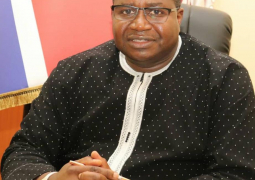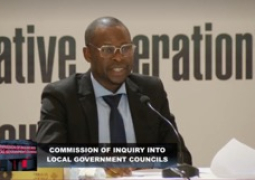
Ceesay, who also serves as chairman of the Basse Area Council, emphasised the importance of capacity building and institutional reform, during the closing of the five days training.
The training, held at Tendaba Camp in the Lower River Region, focuses on effective planning methodologies, resource mobilisation, and performance monitoring for the eight councils across the country. It is supported by the European Union and the United Nations Development Programme (UNDP) under the GREAT Project.
“This is the second activity under the GREAT Project, and it couldn’t have come at a better time,” Ceesay said. “We are here to critically examine our resource mobilisation strategies. GALGA will continue to support efforts to build staff capacity across councils.”
Ceesay referenced the ongoing revelations from the Local Government Commission of Inquiry, which has exposed inefficiencies and breaches of due process within council operations. He urged participants to treat the findings as a learning opportunity.
He challenged council staff to stand firm in the face of political pressure and uphold the law: “Don’t be the kind of CEO or administrator who simply says ‘yes sir’ to every directive. As technicians, your role is to keep the council on track. If something is wrong, regardless of who proposes it, you must speak up. History will judge you by whether you gave sound advice, not by whether you pleased your chairman or mayor.”
Lamin L.M. Marr, the Chief Executive Officer of the Mansakonko Area Council underscored the significance of the training.
The training, which covered financial management, resource mobilisation, and citizen engagement, was praised for its relevance and timeliness. Marr noted that the materials provided were tailored to the operational realities of local councils with knowledge that, he said, “ you might not even gain within the four walls of a university.”
“If you operate within the law, no matter what the chairman or CEO says, you can stand your ground and say, ‘this is what the Act says, and we cannot go beyond it,’” he added.
Aminata Ndongo, the director of Administration at Brikama Area Council, echoed the importance of the training and called for a collective effort to address capacity gaps.
“It pains me when people say councils lack capacity,” she said. “We must stop complaining and start fixing these gaps. Let’s resolve to make our councils better.”
Momodou Bah, representing the Ministry of Lands and Regional Government, acknowledged the challenges councils face and pledged support from the ministry.
“We are aware of the difficulties,” Bah said. “We will engage the ministry to address them. It’s also vital that councils engage their citizens, so we at the ministry can engage politicians to ensure rates and revenues are properly valued and increased.”
The overarching message from the training was clear: councils must embrace transparency, resist political interference, and commit to serving the public interest. With support from international partners and a renewed focus on accountability, local government in The Gambia has an opportunity to rebuild trust and deliver meaningful change.





